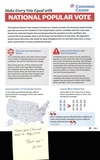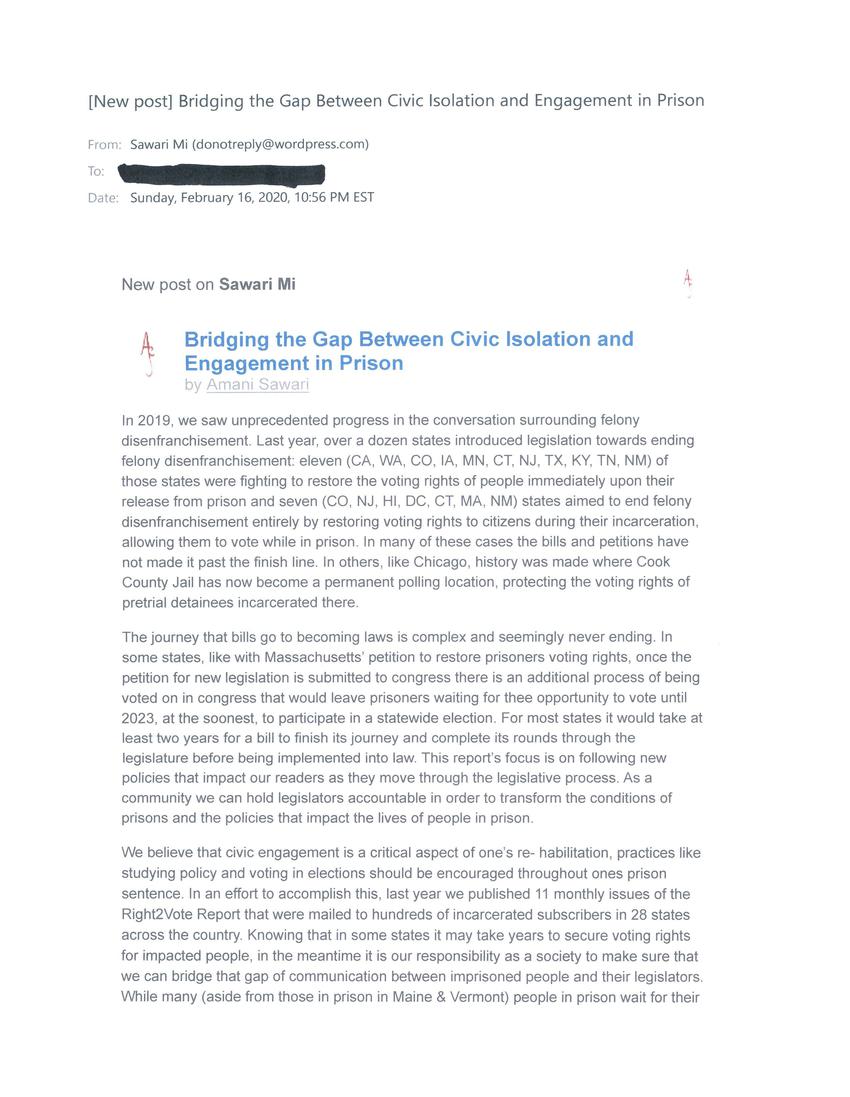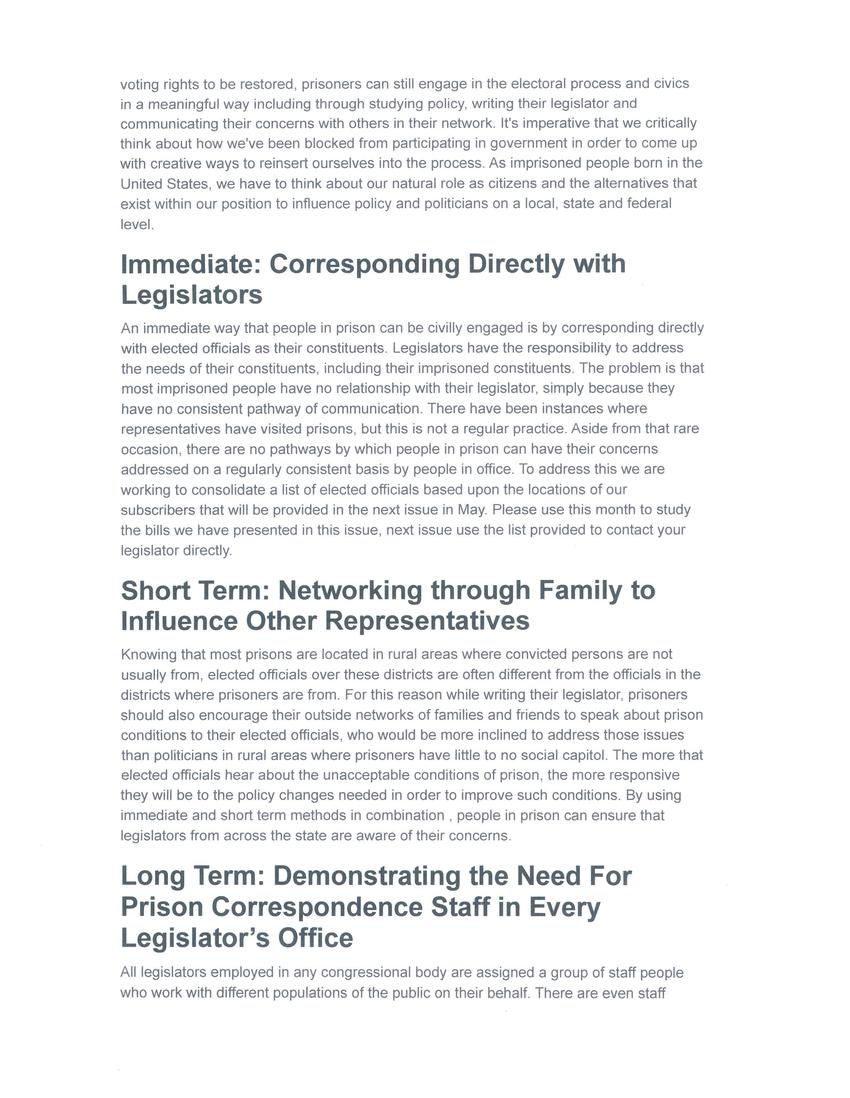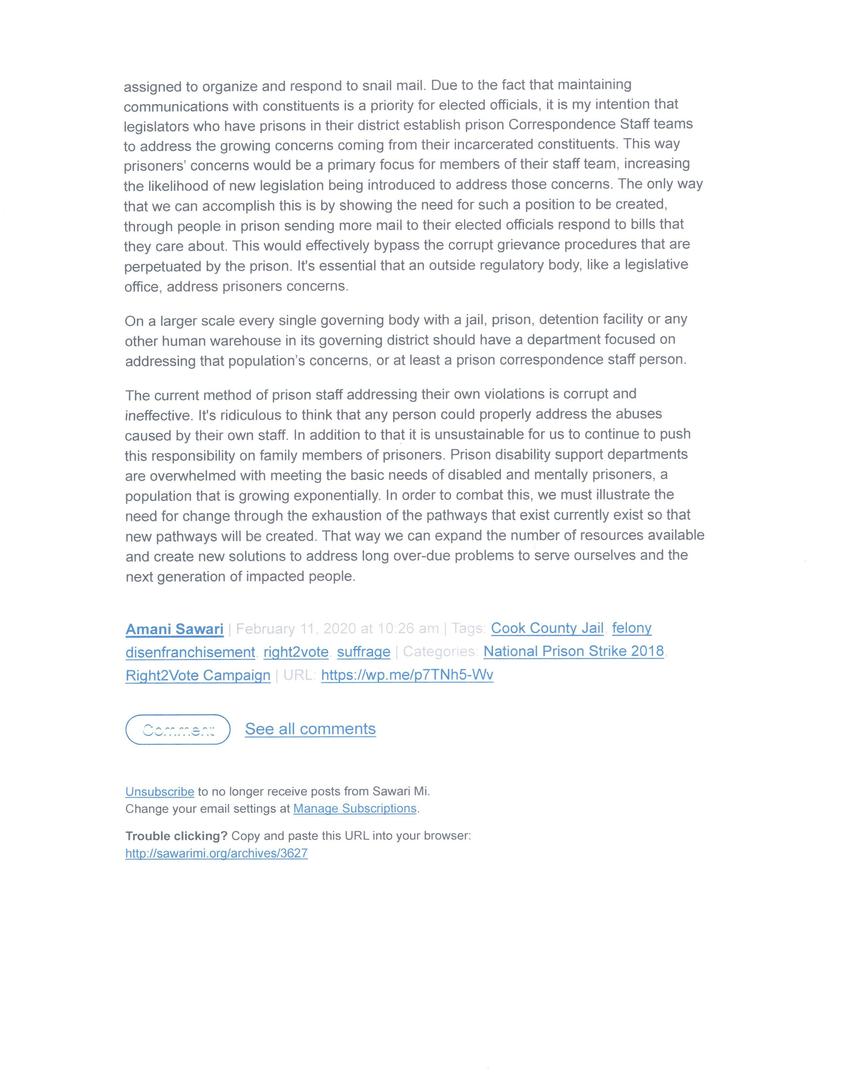
Transcription
[New Post] Bridging the Gap Between Civic Isolation and Engagement in Prison.
From: Sawari Mi (donotreply@wordpress.com)
To: REDACTED
Date: Sunday, February 16, 2020, 10:56 PM EST
New post on Sawari Mi
Bridging the Gap Between Civic Isolation and Engagement in Prison
by Amani Sawari
In 2019, we saw unprecedented progress in the conversation surrounding felony disenfranchisement. Last year, over a dozen states introduced legislation towards ending felony disenfranchisement: eleven (CA, WA, CO, IA, MN, CT, NJ, TX, KY, TN, NM) of those states were fighting to restore the voting rights of people immediately upon their release from prison and seven (CO, NJ, HI, DC, CT, MA, NM) states aimed to end felony disenfranchisement entirely by restoring voting rights to citizens during their incarceration, allowing them to vote while in prison. In many of these cases the bills and petitions have not made it past the finish line. In others, like Chicago, history was made where Cook County Jail has now become a permanent polling location, protecting the voting rights of pretrial detainees incarcerated there.
The journey that bills go to becoming laws is complex and seemingly never ending. In some states, like with Massachusetts' petition to restore prisoners' voting rights, once the petition for new legislation is submitted to congress there is an additional process of being voted on in congress that would leave prisoners waiting for the opportunity to vote until 2023, at the soonest, to participate in a statewide election. For most states, it would take at least two years for a bill to finish its journey and complete rounds through the legislature before being implemented into law. This report's focus is on following new policies that impact our readers as they move through the legislative process. As a community we can hold legislators accountable in order to transform the conditions of prisons and the policies that impact the lives of people in prison.
We believe that civic engagement is a critical aspect of one's rehabilitation, practices like studying policy and voting in elections should be encouraged throughout ones prison sentence. In an effort to accomplish this, last year we published 11 monthly issues of the Right2Vote Report that were mailed to hundreds of incarcerated subscribers in 28 states across the country. Knowing that in some states it may take years to secure voting rights for impacted people, in the meantime it is our responsibility as a society to make sure that we can bridge a gap of communication between imprisoned people and their legislators. While many (aside from those in prison in Maine and Vermont) people in prison wait for their voting rights to be restored, prisoners can still engage in the electoral process and civics in a meaningful way through studying policy, writing their legislator and communicating their concerns with others in their network. It's imperative that we critically think about how we've been blocked from participating in government in order to come up with creative ways to reinsert ourselves into the process. As imprisoned people born in the United States, we have to think about our natural role as citizens and the alternatives that exist within our position to influence policy and positions on a local, state and federal level.
IMMEDIATE: CORRESPONDING DIRECTLY WITH LEGISLATORS
An immediate way that people in prison can be civilly engaged is by corresponding directly with elected officials as their constituents. Legislators have the responsibility to address the needs of their constituents, including their imprisoned constituents. The problem is that most imprisoned people have no consistent pathway of communication. There have been instances where representatives have visited prisons, but this is not a regular practice. Aside from that rare occasion, there are no pathways by which people in prison can have their concerns addressed on a regular consistent basis by people in office. To address this we are working to consolidate a list of elected officials based upon the locations of our subscribers that will be provided in the next issue in May. Please use this month to study the bills we have presented in this issue, next issue use the list provided to contact your legislator directly.
SHORT TERM: NETWORKING THROUGH FAMILY TO INFLUENCE OTHER REPRESENTATIVES
Knowing that most prisons are located in rural areas where convicted persons are not usually from, elected officials over these districts are often different from the officials in the districts where prisoners are from. For this reason while writing to their legislator, prisoners should also encourage their friends to speak about prison conditions to their elected officials, who would be more inclined to address these issues than politicians in rural areas where the prisoners have little to no social capitol. The more that elected officials hear about the unacceptable conditions of prison, the more responsive they will be to the policy changes needed in order to improve such conditions. By using immediate and short term methods in combination, people in prison can ensure that legislators from across the state are aware of their concerns.
LONG TERM: DEMONSTRATING THE NEED FOR PRISON CORRESPONDENCE STAFF IN EVERY LEGISLATOR'S OFFICE
All legislators employed in any congressional body are assigned a group of staff people who work with different populations of the public on their behalf. There are even staff assigned to organise and respond to snail mail. Due to the fact that maintaining communications with constituents is a priority for elected officials, it is my intention that legislators who have prisons in their district establish prison Correspondence Staff teams to address the growing concerns coming from their incarcerated constituents. This way prisoners' concerns would be a primary focus for members of their staff team, increasing the likelihood of new legislation being introduced to address those concerns. The only way that we can accomplish this is by showing the need for such a position to be created, through people in prison sending more mail to their elected officials respond to bills that they care about. This would effectively bypass the corrupt grievance procedures that are perpetuated by the prison. It's essential that an outside regulatory body, like a legislative office, address prisoners concerns.
On a larger scale ever single governing body with a jail, prison, detention facility or any other human warehouse in its governing district should have a department focused on addressing that population's concerns, or at least a prison correspondence staff person.
The current method of prison staff addressing their own violations is corrupt and ineffective. It's ridiculous to think any person could properly address the abuses caused by their own staff. In addition to that it is unsustainable for us to continue to push this responsibility on family members of prisoners. Prison disability support departments are overwhelmed with meeting basic needs of disabled and mentally ill prisoners, a population that is growing exponentially. In order to combat this, we must illustrate the need for change through the exhaustion of the pathways that exist currently so that new pathways will be created. That way we can expand the number of resources available and create new solutions to address long over-due problems to serve ourselves and the next generation of impacted people.
Other posts by this author
|
2023 may 31

|
2023 mar 20

|
2022 aug 23

|
2022 aug 23

|
2022 aug 23

|
2022 aug 23

|
More... |




Replies